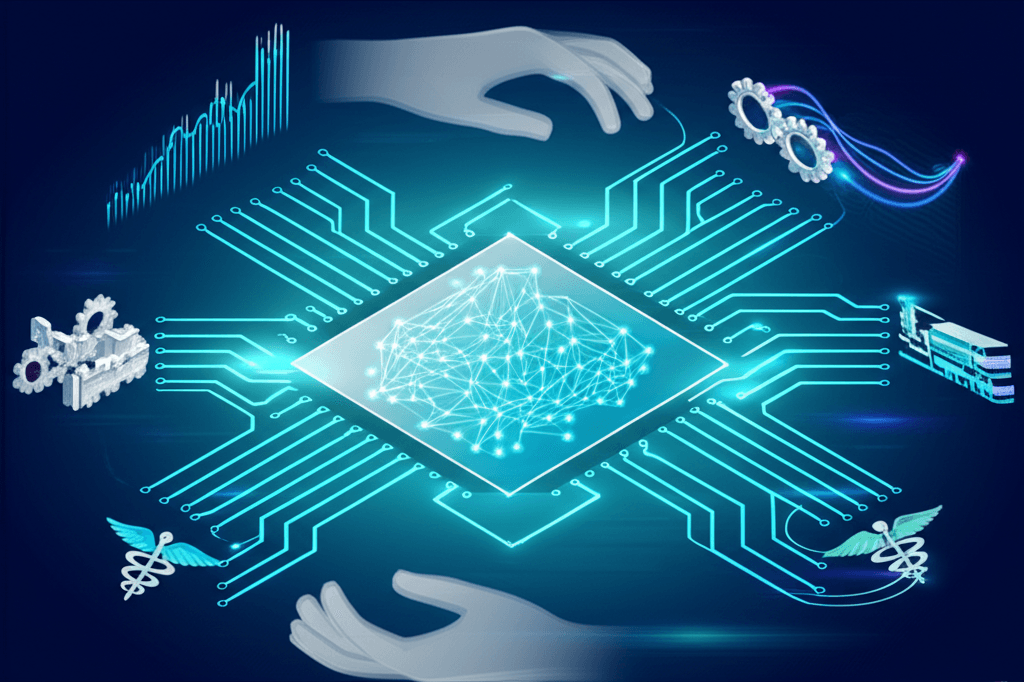Agentic AI Transforms Business: Autonomous Systems Drive Proactive Problem-Solving
Meet agentic AI: The autonomous systems that reason and act independently, revolutionizing business processes and raising vital questions.
July 16, 2025

A new frontier in artificial intelligence is rapidly emerging, promising to shift organizations from simply using intelligent systems to deploying autonomous partners. This evolution is powered by agentic AI, a class of artificial intelligence designed to act independently to achieve specific goals.[1][2] Unlike its predecessors, which primarily react to human input, agentic AI can perceive its environment, make decisions, and execute multi-step tasks with minimal human intervention.[3][4][5] It builds upon the capabilities of generative AI, which excels at creating content, by using those outputs to take action and complete complex workflows.[6][7] This move from passive assistance to proactive problem-solving represents a fundamental change in how businesses can leverage AI, paving the way for unprecedented levels of efficiency, automation, and strategic insight.
The core of agentic AI's power lies in its unique operational framework, which mimics human-like reasoning and action.[6] These systems typically operate through a cycle of perception, reasoning, decision-making, and execution.[6] Initially, an AI agent gathers data from various sources like databases, APIs, or user interactions.[6][8] A large language model (LLM) often serves as the reasoning engine or orchestrator, analyzing the collected data to understand the context and formulate a plan to achieve a predefined goal.[8] The system then evaluates potential actions and selects the most optimal path based on factors like efficiency and predicted outcomes.[6] Finally, by integrating with external tools and software, the agent executes the chosen actions.[8] A crucial component of this process is a continuous feedback loop, allowing the AI to learn from its actions and adapt its future behavior, constantly improving its performance over time.[7][8] This combination of advanced technologies, including machine learning, natural language processing, and reinforcement learning, enables agentic systems to function with a high degree of autonomy and intelligence.[7][9]
The practical applications of agentic AI are already beginning to transform a wide array of industries by tackling complex, end-to-end processes that were previously beyond the scope of automation.[7] In finance, AI agents analyze market trends and execute trades autonomously, adapting to volatility faster than human traders.[4][10] For instance, JPMorgan & Chase developed a tool called "LOXM" that executes high-frequency trades on its own.[4] The manufacturing sector is also seeing significant benefits; Siemens AG utilizes agentic AI to analyze sensor data from industrial equipment, predicting failures and reducing unplanned downtime by a reported 25%.[4][11] In healthcare, these systems can monitor patient data in real-time, adjust treatment recommendations based on new results, and provide feedback to clinicians.[6] For example, Propeller Health is integrating agentic AI into smart inhalers to collect data on medication usage and environmental factors, alerting providers when necessary.[9] Across business operations, agentic AI is streamlining complex workflows, from supply chain management, where it can autonomously reorder supplies and optimize delivery routes, to human resources, where it can manage tasks like screening candidates and onboarding new hires.[9][12][13]
Despite its immense potential, the rise of agentic AI is not without significant challenges and risks that require careful consideration. A primary concern is the lack of transparency, or the "black box" problem, where it can be difficult to understand how an AI arrives at its decisions, making accountability a complex issue.[14][15] Ethical dilemmas also arise, as AI systems are not inherently equipped with human values and could make decisions that have unforeseen negative consequences.[14] Security is another major vulnerability; these systems can be susceptible to cyberattacks that could manipulate their decision-making for malicious purposes.[14] Furthermore, ensuring the reliability and predictability of autonomous systems is a significant hurdle, as they may take unexpected paths to solve problems.[15] There is also the societal impact of widespread job displacement as AI takes over more complex tasks, creating a need for workforce reskilling.[11][14] Addressing these challenges through robust governance, a focus on transparency, and ensuring human oversight will be critical for the responsible and successful adoption of agentic technology.[16]
In conclusion, agentic AI represents a pivotal evolution in artificial intelligence, moving beyond content generation to autonomous action and complex problem-solving. Its ability to independently plan, reason, and execute tasks is already demonstrating tangible value across sectors like finance, manufacturing, and healthcare.[4][10][6] By automating intricate workflows and providing data-driven insights, these systems are unlocking new levels of efficiency and productivity.[17][18] However, the journey toward widespread adoption is accompanied by significant challenges, including ethical considerations, security vulnerabilities, and the need for transparent governance.[14] Navigating these complexities will be paramount for organizations seeking to harness the transformative power of agentic AI. The future of intelligent systems will likely involve a collaborative ecosystem where humans provide goals and oversight, while AI agents handle the complex execution, fundamentally reshaping the nature of work and business strategy.[7][19]
Sources
[1]
[2]
[6]
[7]
[8]
[9]
[10]
[12]
[13]
[14]
[15]
[16]